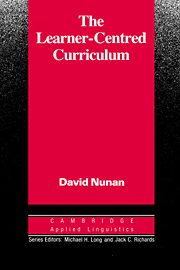Book contents
- Frontmatter
- Contents
- Series Editors' Preface
- Preface
- 1 Introduction
- 2 Curriculum Processes
- 3 Learner-Centred Curriculum Development
- 4 Pre-Course Planning Procedures
- 5 Planning Content
- 6 Methodology
- 7 Resources for a Learner-Centred Curriculum
- 8 Assessment and Evaluation
- 9 Evaluation and Professional Development
- 10 The Teacher as Curriculum Developer
- References
- Appendix
- Subject Index
- Author Index
- Frontmatter
- Contents
- Series Editors' Preface
- Preface
- 1 Introduction
- 2 Curriculum Processes
- 3 Learner-Centred Curriculum Development
- 4 Pre-Course Planning Procedures
- 5 Planning Content
- 6 Methodology
- 7 Resources for a Learner-Centred Curriculum
- 8 Assessment and Evaluation
- 9 Evaluation and Professional Development
- 10 The Teacher as Curriculum Developer
- References
- Appendix
- Subject Index
- Author Index
Summary
Traditional Approaches to the Curriculum
Why does Teacher A teach functions but not structures? Why does Teacher B try to encourage learners to discover their own errors rather than correcting the learners herself? Why does Teacher C try to develop communication skills through role play, language games and so on, rather than through drills and controlled practice activities? Why does Teacher D create all her own materials through authentic sources, while Teacher E, who has students with similar needs, uses coursebooks written by someone else?
Some teachers claim that teaching is essentially a practical activity, and has very little to do with the theoretical deliberations of educational philosophers, psychologists and curriculum designers. Stern, in fact, suggests that this is a characteristic of language teachers in general:
Language teachers can be said to regard themselves as practical people and not as theorists. Some might even say they are opposed to ‘theory’, expressing their opposition in such remarks as ‘It's all very well in theory, but it won't work in practice’.
(Stern 1983:23)However, as Stern goes on to observe, implicit in all the decisions made by the teacher relating to classroom practice, materials, methodology and content is a theory about the nature of language and the nature of language learning. Not all teachers will be able to articulate their theories, but they will have them just the same, and they lie behind the sorts of questions posed at the beginning of this chapter.
Information
- Type
- Chapter
- Information
- The Learner-Centred CurriculumA Study in Second Language Teaching, pp. 10 - 20Publisher: Cambridge University PressPrint publication year: 1988
